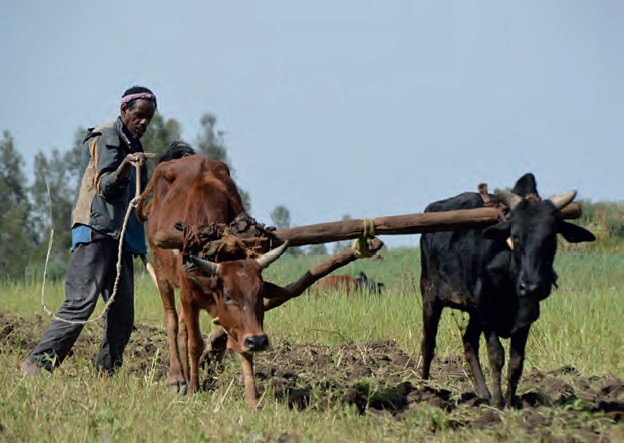CommonSense
Weather and agro-advisory services for farmers in Ethiopia
> Download the CommonSense project closure flyer
The CommonSense project targeted smallholder farmers in four regions of Ethiopia. Sesame and sorghum are important crops for these farmers. The farmers were reached directly or through actors across the agricultural value chain, such as unions, cooperatives, and micro-finance institutions (MFIs). CommonSense provided them with actionable information based on geodata
and satellite information. The services were provided through a platform with dedicated dashboards and including monitoring current and predicting future crop conditions, weather forecasts, crop suitability assessment and risk analysis based on historical satellite and weather data. The goals were to increase income and to reduce risk for Ethiopian farmers supporting them directly or through their intermediaries in the relevant value chains.
Provided services
The CommonSense partnership developed an aggregators app for farmer unions and agro-processors called TERRA, provided by CommonSense partner Apposit (an information technology solution provider). This was bundled with an eVoucher system that enables farmer unions and agro-processors to organise, monitor and serve their farmer members more efficiently. In addition an agricredit assessment tool (A-CAT) for inclusive finance was developed by Wageningen Environmental Research, that is marketed by Cordaid (an NGO) and Gebeya (an IT & marketing company).
Two services for farmers complete the portfolio, developed in collaboration with the Ethiopian Ministry of Agriculture and Livestock Resources (MoALR) and the National Meteorological Agency (NMA): an SMS-service with short and medium weather forecasts, provided by Weather Impact (a weather products service provider), Apposit and the Sesame Business Network and an agrometeo advisory service at Woreda (district) level, developed by Wageningen Environmental Research. This service supports the work of extension officers.
Satellite information provided added value to the services (seasonal crop monitoring, weather forecasts, historical analysis).

Business model
CommonSense developed very good relations with government agencies, enabling the embedding of the developed services in the Ethiopian context. This was a necessary condition for obtaining a “licence-to-operate” in Ethiopia, but also contributed to achieving mutual cooperation and the formation of partnerships.
CommonSense developed two types of services, depending on the client: commercial and government-oriented. This had consequences for the business model: the first type of services was, by definition, selfsupporting while for the second type the government was the main client and public or donor funding was necessary.
The commercial services were paid either through a subscription in the form of an
annual fee or based on the number of transactions. Integrating the services with other services, e.g. the eVoucher system or services of inclusive finance providers.
For the government applications CommonSense has been exploring other solutions, that are compatible with the Ethiopian regulatory framework. These include both public and donor funding.
Impact
During the project period the CommonSense partnership managed to reach 366,000 farmers indirectly though TERRA, owned by Apposit, and through collaboration with eight Ethiopian farmer unions. This indirect reach included 76,000 women (20%) and 35,500 young farmers (10%).
At the end of the project a total of 8,500 farmers had subscribed to the CommonSense services: 3,000 to the SMS weather service, 3,500 to the farm management app and 2,000 to the agri-credit assessment tool.
COVID and the conflict that affected the project focus regions of Tigray and northern Amhara had a negative effect on the continuity of the services, except for the weather forecasts. In 2020 an MoU was signed between CommonSense partners and the NMA to continue the weather information service, paid for by the Sesame Business Network. The number of farmers using the service increased to 5,000.
Even though follow-up funding was secured through the Resilient Agriculture for Inclusive and Sustainable Ethiopian Food Systems (RAISE-FS) project, funded by the Dutch Embassy, the continuation of the conflict led to the cessation of services at the end of 2020. Prospects for a resumption of the same service are conditioned by the restoration of security conditions in the affected areas. Of course, it will also be necessary to consider the changed conditions on the part of service providers, who have in the meantime focussed on other markets and geographies.
Partnership
Lead partner:
-
Wageningen Environmental Research (Alterra) (Netherlands) project lead, agricultural monitoring and risk assessment. It also links with the WUR BENEFIT project in Ethiopia, which include the Sesame Business Network support programme and CASCAPE (best farming practices)
Partners:
- IT platform and Unions’, business development: APPOSIT (Ethiopia)
- Microfinance institutions and MFI business development: Busaa Gonofaa (Ethiopia), SFPI (Ethiopia), HARBU Microfinance Institution (Ethiopia) and ICCO Terrafina, Microfinance (Netherlands)
- Remote sensing services: Airbus Defence and Space Netherlands (Netherlands)
- User needs assessment, pilots and capacity building: Exotalent (Ethiopia) and Facilitators for Change (Ethiopia)
- Weather information services: Weather Impact (Netherlands). The project has established Memorandum of Understanding with the MOALR and the NMA, and collaborations with the Federal Cooperative Agency, the Agricultural Transformation Agency and other government organisations of Ethiopia.
The project has established Memorandum of Understanding with the MoALR and the NMA, and collaborations with the Federal Cooperative Agency, the Agricultural Transformation Agency and other government organisations of Ethiopia. It is also cooperating with Agriterra (Netherlands).
| Country | Ethiopia |
| Services | Crop management adviceWeather informationAgricultural input loansFarmer profile information |
| Crops | SesameSorghum |
| Target groups | Farmer (smallholders)Farmer organisationMicrofinance instituteAgri-businessGovernment |
| Project period | 2015-2018 |